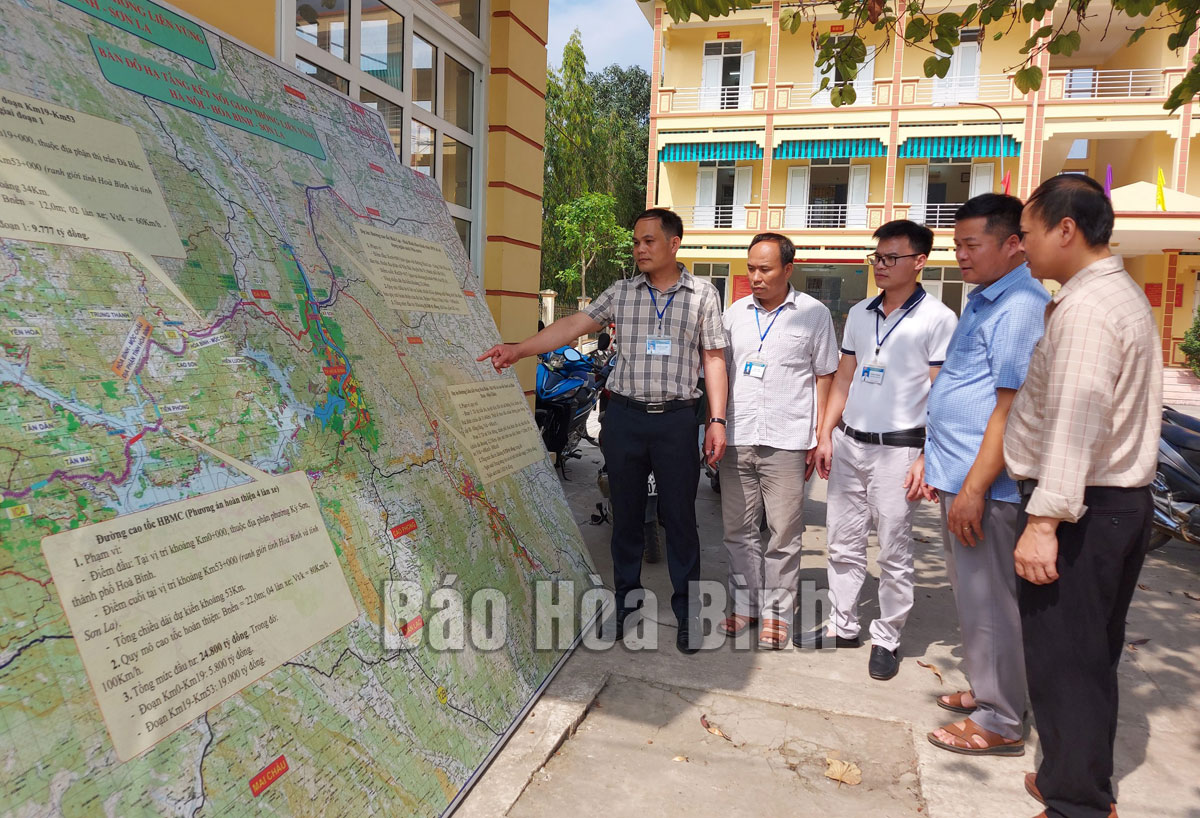(HBO) - Nguyen Xuan Phuc, Chairman of the People's Committee of Mong Hoa commune (Hoa Binh City) said that the city Party Committee has issued Resolution No. 04-NQ/TH.U, dated April 20, 2021 on building Hoa Binh city into a class-II city before 2025. Based on the assessment of the infrastructure development level of communes in the city, the municipal Party Committee has decided to devise a project on turning Mong Hoa commune into a ward. The commune is mobilising resources to implement solutions to meets the criteria and standards of class-III urban area.
Officials of Mong Hoa
commune (Hoa Binh city) review the implementation of urban standards in the
locality.
Mong Hoa commune has a natural area of over 43.86 sq.m and 1,836 households.
The commune Party Committee has 19 party cells and 625 party members. The Party Committee, authorities and people of Mong Hoa commune have focused on
socio-economic development and achieved many important results. More capital
has been poured into infrastructure, particularly roads, schools and
electricity facilities to serve production and daily life of local residents.
The commune was recognised as meeting the enhanced standards of new-style rural
areas on December 31, 2021.
Phuc said that there are 45 enterprises operating in the commune, creating jobs
for over 2,000 local workers and contribute to sustainable economic
restructuring. By 2022, the commune's per capita income reached 60 million VND (2,563 USD).
There are 28 poor households, accounting for 1.52%.
There are three major roads running through the commune, including 8 km of
National Highway No 6, 2km of Hoa Lac - Hoa Binh road, and 3km of the
provincial road No 446. Besides, work is underway on a 7km section of the
regional road in the commune. This is a favourable condition for the flow of
goods and socio-economic development of the locality.
Up to 266 households voluntarily donated 1.8ha of land to expand rural roads in
the 2020 – 2022 period. Up to now, the commune has satisfied nine out of 13 standards for urban
infrastructure development in line with Resolution No. 26/2022/UBTVQH15, dated
September 21, 2022, of the National Assembly Standing Committee, including
those relating to communal health stations; commercial infrastructure; land for
preschool and secondary school; land for cultural, physical training and sports
facilities per capita and percentage of households collecting and treating
domestic wastewater by appropriate methods. Four standard criteria have not been met, namely educational facilities,
percentage of lit roads, percentage of the urban population supplied with clean
water and density of main sewer pipes.
In order to be recognised as meeting Class-III urban wards, all educational
establishments must satisfy the standards of level 1 of the Ministry of
Education and Training. The commune has asked the city's People's Committee and
education department to devise a plan to help Dan Hoa primary school and Mong
Hoa secondary school to meet level 1 of national standards in 2024.
Regarding the criterion of the percentage of lit roads to be 95% or higher, the
city and relevant sectors are taking steps to invest in building a lighting
system along National Highway No 6 and lighting systems for other roads in the
commune to meet the standard by 2025. As for the criterion on the
percentage of the urban population supplied with clean water through the
centralised water supply system and using hygienic water sources, the commune
has proposed the city and the Department of Agriculture and Rural Development
carry out projects that meet the requirements.
Currently, Mong Hoa commune continues to call for private investment to meet
the urban criteria such as building lighting and decorative lighting systems;
collection and treatment of domestic wastewater; and mobilising people to
donate land to upgrade rural roads and cultural, physical training and sports
facilities.



